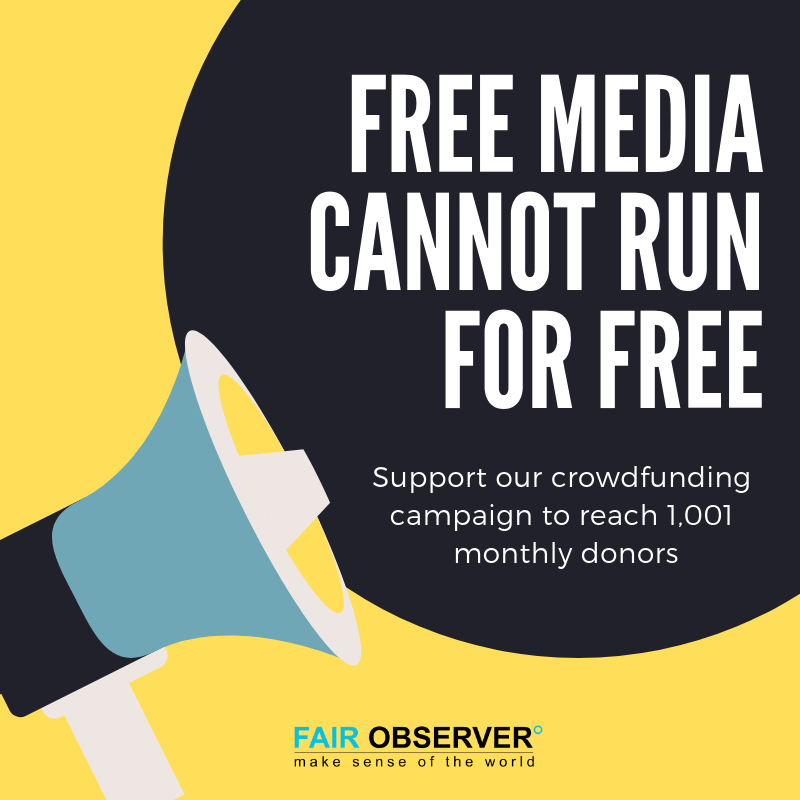Iranian youths want to speak their mind and express their frustration, but are doing so in counterproductive ways.
Iranian society is divided more than ever. Social fragmentation stems from a range of issues, including foreign policy failures, widespread corruption, a lack of transparency, restrictions on the media and the infringement of civil liberties.
The US withdrawal from Joint Comprehensive Plan of Action (JCPOA) — aka the nuclear deal — has added to Iran‘s rifts by pitting a large group of people against the government and turning Iranians against each other. The result is that ordinary people are expressing themselves in ways that might sound irrational, such as fiercely clashing with fellow citizens on social media. For the people, there are not many reasons to be happy, and this public frustration has manifested itself on the internet. Iranians want to express themselves, but they are doing so by being counterproductive.
Iranian authorities continuously talk of the country as a role model for the Muslim world and as an independent nation that doesn’t bow down to global superpowers. Instead, the government says the country gains strength from the piety, resistance and steadfastness of its people and the revolutionary values that govern society. These are fancy statements that officials make all the time. But how close are they to reality?
Indeed, Iran has been through colossal difficulties ever since the 1979 revolution. It survived one of the longest wars of the 20th century with Saddam Hussein’s Iraq in the 1980s, which left around a million people dead. Iran has also had to deal with economic sanctions since the early days of the revolution.
Iranians who were part of the movement that toppled the kingdom of autocratic ruler Shah Mohammad Reza Pahlavi justify the difficulties and sanctions that Iran faces, even though they seem unhappy with the situation today. But young Iranians have different expectations. They are responding to new developments and emerging challenges with extreme passion — but not necessarily with logic — and exhibiting impatience with how they behave online.
Iran’s challenges are characterized by crippling economic sanctions imposed by the US over its nuclear program. This makes trade with Iran difficult and adds to socioeconomic difficulties for the people. Skirmishes continue between the state and the more educated, pro-reform youths, as manifested in several crackdowns on universities in recent years and the closure of hundreds of independent, pro-reform newspapers. Added to this is the imprisonment of tens of talented journalists, students and human rights activists.
The authorities make unfulfilled promises and find themselves unable to address the dilemmas ahead for the country. These government failures are making the online behavior of Iranian youths who want to express their opinion about the state of affairs both antagonistic and unsafe.
Lost “online ethics”
Twitter is one of several social networks that are banned in Iran. However, the majority of government officials — including the supreme leader, Ayatollah Ali Khamenei — maintain Twitter accounts. No specific reason is mentioned for the continued ban of the network. When asked why it’s blocked, authorities cite vague reasons such as defending “national security” and “ethical values.”
But the paradoxical approach of the government to public access of Twitter and Facebook aside, there are many Iranians who conveniently attack and abuse each other on such platforms (using a VPN) over politics. The use of vulgar and threatening language has become rampant in Twitter conversations about the state of the country and nuclear politics. Article 19, a UK-based nonprofit, mentioned in a report that the online behavior of Iranians has become remarkably unsafe and risky.
 It’s common to see Iranians on Twitter exchanging insults over something said by the president, the fluctuation of oil prices or rising exchange rates. This is one of the ways that Iran’s deep divisions, shaped and grown under the Islamic Republic, can be seen. People do not respect and trust each other, and they have a lack of tolerance for differences of opinion.
It’s common to see Iranians on Twitter exchanging insults over something said by the president, the fluctuation of oil prices or rising exchange rates. This is one of the ways that Iran’s deep divisions, shaped and grown under the Islamic Republic, can be seen. People do not respect and trust each other, and they have a lack of tolerance for differences of opinion.
Why? Because the strongmen in Iran who are in high positions and have the authority to implement reform use religion and moral values as the grounds for their misleading and prone-to-failure political decisions. And they undermine the same values by failing to practice what they preach.
It was only after the US withdrawal from the nuclear deal that Ayatollah Khamenei challenged US President Donald Trump using strong language, saying: “You cannot do a damn thing!” It was shortly after this when a group of Iranian politicians set the US flag on fire in parliament and ripped up a copy of the JCPOA. Promoting aggression of this kind only influences public sentiment. So, when those who boast of religious and ethical values undermine the same values in their words and actions, nothing less should be expected of the general public but a replication of belligerent acts in similar ways.
These days, aggression and having a verbal conflict online over politics has turned into a habit for many Iranians, and those who feel protected — i.e., supporters of hardliners and conservatives — are engaged in online campaigns of hatred more ferociously.
Iranian trolls
There are many well-known instances of Iranian users attacking and insulting international celebrities, including football players, actors and even politicians and their families via social media. When Barack Obama was in office, thousands of Iranian users flocked his Instagram page in July 2015 to either express their thanks or anger over the JCPOA. They bombarded his profile with hundreds of comments about the agreement, as if it was the proper platform to exchange views and wage a battle over the nuclear deal.
It is believed that the Iranian government has online trolls who promote the narrative of the state concerning domestic and international issues. A 2012 report by researchers of the Oxford University, titled “Troops, Trolls and Troublemakers: A Global Inventory or Organized Social Media Manipulation,” estimates that there are 20,000 individuals affiliated with the government to wage propaganda games online in favor of Tehran. These trolls utilize social media networks to carry certain messages at critical political junctures to manipulate public sentiment.
Online Iranian trolls also react to sports events. In 2014, thousands of Iranians bombarded the Facebook page of Argentine superstar Lionel Messi after he scored the sole winning goal for Argentina in a FIFA World Cup match against Iran. In 2013, shortly after the Iran-Italy match in the FIVB World League, hundreds of Iranians took to the Instagram page of Italian volleyball player Ivan Zaytsev and flooded it with insults. Zaytsev had secured 19 consecutive points for Italy in two sets and an easy victory for his squad against Iran. He expressed sorrow over the comments he received from Iranians.
These are all symptoms of a society that is grappling with economic sanctions, unanswered questions, stagnation, an identity crisis and wide gaps that make the future bleak. The people of Iran, especially its youths, are looking for avenues to speak their mind and express their frustration. But, for a number of reasons, they are doing so in ways that are morally and professionally indefensible.
The views expressed in this article are the author’s own and do not necessarily reflect Fair Observer’s editorial policy.
Support Fair Observer
We rely on your support for our independence, diversity and quality.
For more than 10 years, Fair Observer has been free, fair and independent. No billionaire owns us, no advertisers control us. We are a reader-supported nonprofit. Unlike many other publications, we keep our content free for readers regardless of where they live or whether they can afford to pay. We have no paywalls and no ads.
In the post-truth era of fake news, echo chambers and filter bubbles, we publish a plurality of perspectives from around the world. Anyone can publish with us, but everyone goes through a rigorous editorial process. So, you get fact-checked, well-reasoned content instead of noise.
We publish 2,500+ voices from 90+ countries. We also conduct education and training programs
on subjects ranging from digital media and journalism to writing and critical thinking. This
doesn’t come cheap. Servers, editors, trainers and web developers cost
money.
Please consider supporting us on a regular basis as a recurring donor or a
sustaining member.
Will you support FO’s journalism?
We rely on your support for our independence, diversity and quality.






